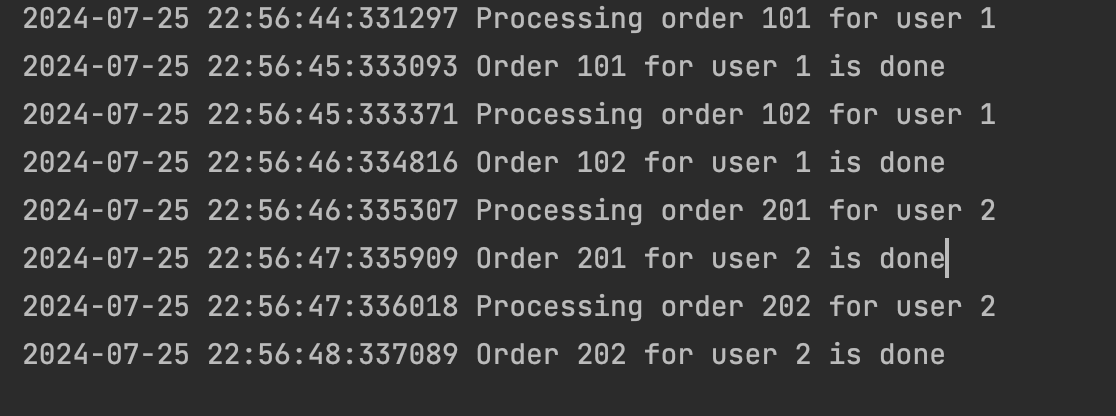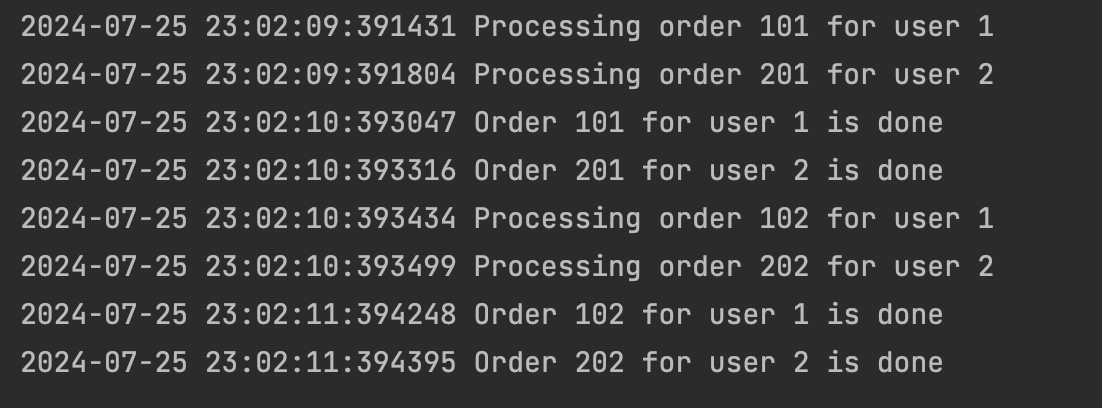python 协程 自定义互斥锁
最近在用python的一款异步web框架sanic搭建web服务,遇到一个需要加特定锁的场景:同一用户并发处理订单时需要排队处理,但不同用户不需要排队。
如果仅仅使用async with asyncio.Lock()的话。会使所有请求都排队处理。
1 import asyncio 2 import datetime 3 4 lock = asyncio.Lock() 5 6 7 async def place_order(user_id, order_id): 8 async with lock: 9 # 模拟下单处理 10 print(f"{datetime.datetime.now().strftime('%Y-%m-%d %H:%M:%S:%f')} Processing order {order_id} for user {user_id}") 11 await asyncio.sleep(1) # 假设处理需要 1 秒 12 print(f"{datetime.datetime.now().strftime('%Y-%m-%d %H:%M:%S:%f')} Order {order_id} for user {user_id} is done") 13 14 15 # 定义一个测试函数 16 async def test(): 17 # 创建四个任务,模拟两个 UserID 的并发请求 18 tasks = [ 19 asyncio.create_task(place_order(1, 101)), 20 asyncio.create_task(place_order(1, 102)), 21 asyncio.create_task(place_order(2, 201)), 22 asyncio.create_task(place_order(2, 202)), 23 ] 24 # 等待所有任务完成 25 await asyncio.gather(*tasks) 26 27 28 if __name__ == '__main__': 29 # 运行测试函数 30 asyncio.run(test())

这显然不是想要的结果,第二种方案是定义一个字典,key使用user_id,value为asyncio.Lock(),每次执行前从字典里面获取lock,相同的user_id将会使用同一个lock,那就实现了功能。
import asyncio import datetime locks = {} async def place_order(user_id, order_id): if user_id not in locks: locks[user_id] = asyncio.Lock() async with locks[user_id]: # 模拟下单处理 print(f"{datetime.datetime.now().strftime('%Y-%m-%d %H:%M:%S:%f')} Processing order {order_id} for user {user_id}") await asyncio.sleep(1) # 假设处理需要 1 秒 print(f"{datetime.datetime.now().strftime('%Y-%m-%d %H:%M:%S:%f')} Order {order_id} for user {user_id} is done") # 定义一个测试函数 async def test(): # 创建四个任务,模拟两个 UserID 的并发请求 tasks = [ asyncio.create_task(place_order(1, 101)), asyncio.create_task(place_order(1, 102)), asyncio.create_task(place_order(2, 201)), asyncio.create_task(place_order(2, 202)), ] # 等待所有任务完成 await asyncio.gather(*tasks) if __name__ == '__main__': # 运行测试函数 asyncio.run(test())

但是这个方案会有缺点是,user_id执行完成之后没有释放资源,当请求的user_id变多之后,势必会造成占用过多的资源。继续改进方案,将locks的value加一个计数器,当获取lock时计数器加1,使用完之后计数器-1,当计数器变为小于等于0时,释放locks对应的key。最后将这个功能封装为一个类方便其他地方调用。
import asyncio mutex_locks = {} class MutexObj: def __init__(self): self.lock = asyncio.Lock() self.count = 0 class Mutex: def __init__(self, key: str): if key not in mutex_locks: mutex_locks[key] = MutexObj() self.__mutex_obj = mutex_locks[key] self.__key = key def lock(self): """ 获取锁 :return: """ self.__mutex_obj.count += 1 return self.__mutex_obj.lock def release(self): """ 释放锁 :return: """ self.__mutex_obj.count -= 1 if self.__mutex_obj.count <= 0: del mutex_locks[self.__key]
import asyncio import datetime from utils.mutex import Mutex, mutex_locks locks = {} async def place_order(user_id, order_id): mutex = Mutex(user_id) async with mutex.lock(): try: # 模拟下单处理 print(f"{datetime.datetime.now().strftime('%Y-%m-%d %H:%M:%S:%f')} Processing order {order_id} for user {user_id}") await asyncio.sleep(1) # 假设处理需要 1 秒 print(f"{datetime.datetime.now().strftime('%Y-%m-%d %H:%M:%S:%f')} Order {order_id} for user {user_id} is done") except Exception as ex: print(ex) finally: mutex.release() print('=====================') print(mutex_locks) print('=====================') # 定义一个测试函数 async def test(): # 创建四个任务,模拟两个 UserID 的并发请求 tasks = [ asyncio.create_task(place_order(1, 101)), asyncio.create_task(place_order(1, 102)), asyncio.create_task(place_order(2, 201)), asyncio.create_task(place_order(2, 202)), ] # 等待所有任务完成 await asyncio.gather(*tasks) if __name__ == '__main__': # 运行测试函数 asyncio.run(test())

至此实现了我的需求,此方案只考虑了单应用场景,如果是分布式部署,需要更换方案如redis锁,这里暂且不考虑。如果有其他实现方式,欢迎留言交流。
热门相关:腹黑冷王:娘子不太乖 名门极致宠妻 重生九零娇娇媳 许你盛世安宁 我真不是暴发户